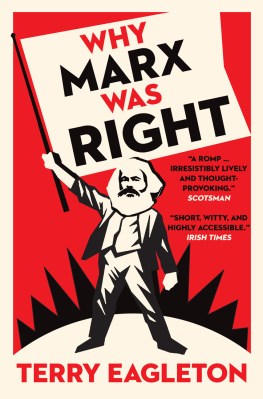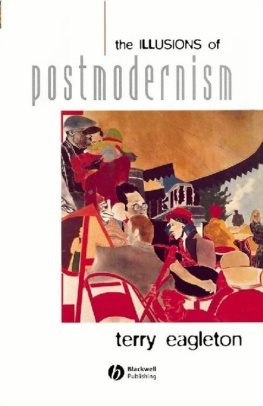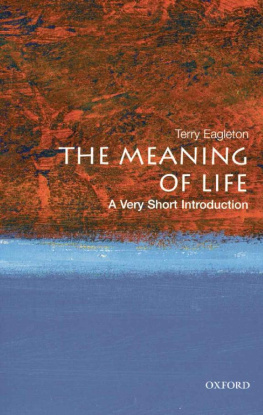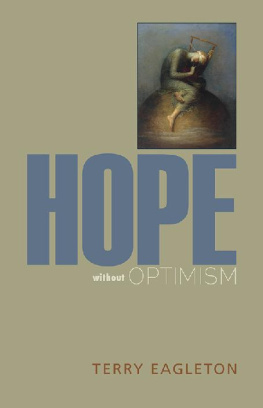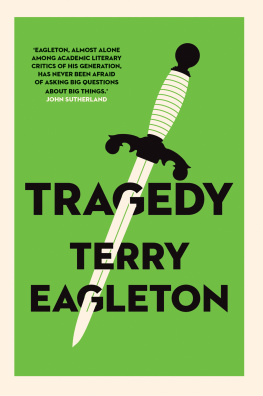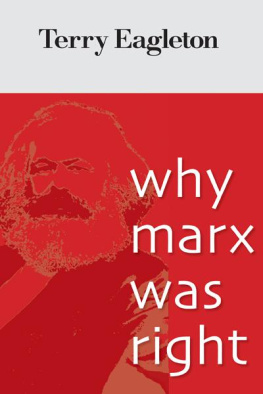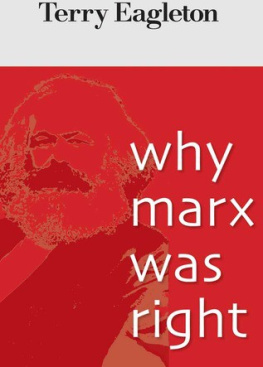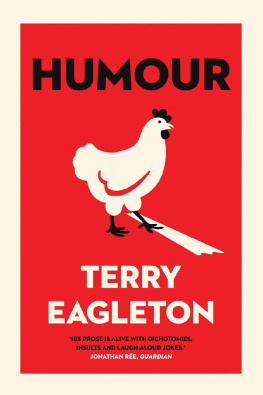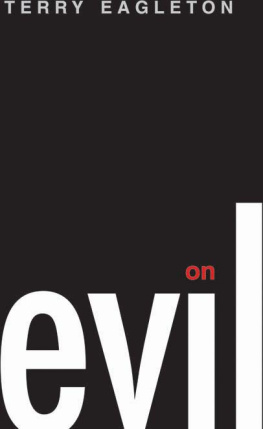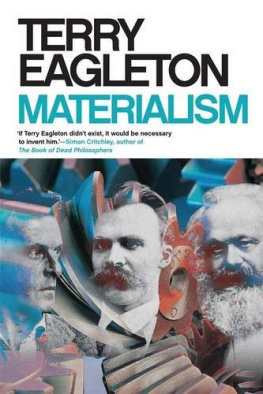Why Marx Was Right
Terry Eagleton is Distinguished Professor of English Literature at Lancaster University. He is the author of more than fifty books spanning the fields of literary theory, post-modernism, politics, ideology and religion. His most recent titlesReason, Faith, and Revolution, On Evil, The Event of Literature, How to Read Literature, Hope Without Optimism, Culture and the Death of God, Culture, Materialism and Radical Sacrificeare published by Yale.
An eloquent, fact-based rebuttal of the usual criticisms of Marxism A volume that is thought-provoking, optimisticand which you can chuckle over.
John Green, Morning Star
A short, witty, and highly accessible jaunt through Marxs thought in preparation for the second coming.
Frank Barry, Irish Times
Reading a book by Terry Eagleton is like watching fireworks The list of Marxisms shortcomings is common coinage, and Eagleton offers convincing counterarguments.
Dennis OBrien, Christian Century

Published with assistance from the Louis Stern Memorial Fund.
Copyright 2011, 2018 Yale University
All rights reserved. This book may not be reproduced, in whole or in part, including illustrations, in any form (beyond that copying permitted by Sections 107 and 108 of the U.S. Copyright Law and except by reviewers for the public press), without written permission from the publishers.
For information about this and other Yale University Press publications, please contact:
U.S. Office:
Europe Office:
Designed by James J. Johnson
Set in Granjon Roman type by Keystone Typesetting, Inc.
Printed in Great Britain by Hobbs the Printers, Totton, Hampshire
Library of Congress Control Number: 2017957268
ISBN 978-0-300-23106-9 (pbk)
First edition ISBN 978-0-300-16943-0 (hbk), 978-0-300-18153-1 (pbk)
A catalogue record for this book is available from the British Library.
10987654321
For Dam and Hadi
Contents
Preface to the Second Edition
S ince this book was first published in 2011, at least one aspect of Marxs thought has been dramatically confirmed. Marx argues that there is a gap in liberal capitalist society between the political sphere and what he calls civil society, meaning social and economic existence. In the formerat the ballot box, for examplemen and women appear equal and autonomous, each of them counting as one; but this simply serves to mask the actual divisions, inequalities and dependencies of everyday life. It is as though the political dimension abstracts from these conditions, so that citizens become pale simulacra of themselves. Only if democratic self-government were extended to civil society itselfin, for example, workers self-managementwould this gap be closed.
For Marx, then, the liberal-democratic political sphere is less than fully real; and what we have witnessed in the West in the years since this book first appeared is a full-blooded reaction to this factnot just a theoretical rejection of orthodox politics, but one that has taken to the streets in over-whelming numbers. It is not just this or that aspect of political life that has been discredited, but the political as such, so that the most powerful nation in the world is prepared to elect as its leader a sinister buffoon drafted in from reality TVin fact, the very incarnation of unrealityrather than lend credence to the conventional political process. Not since the 1930s have we seen such a mass loss of faith in the liberal middle-class political consensus. There have been outbreaks of class warfare and talk of violent revolution, all of it fired by a fury, hatred and despair very far from the sedate, civilised climate of Westminster or Capitol Hill. The ruling class has been publicly trashed, mocked, hooted and howled down, which was not generally the case in the days of Winston Churchill or John F. Kennedy. Politics has become a rough-house, in which you are likely to have your skull smashed in if you find yourself in the wrong spot at the wrong time.
None of this, to be sure, can be greeted by the left with anything but ambivalence. On the one hand, astonishingly, the United Kingdom in 2017 failed by a whisker to elect as its leader a left-wing socialist whose thought is much influenced by Karl Marx. On the other hand, what has taken to the streets is not simply a left-wing populism but a nastily right-wing one as well: racist, chauvinist, violent and authoritarian. Populism has always been double-edged in this way, unleashing some of the most generous egalitarian instincts as well as some of the ugliest ones. It is important to see that such right-wing populism represents one pole of a contradiction built into capitalism itself. As the neo-liberal market system becomes more globalised and intensive, generating a world of ceaseless flux and agitation in which all secure identity and familiar coordinates are thrown into the melting pot, it creates as a backlash to this turmoil a profound sense of anxiety among those who feel themselves uprooted and destabilised by this brave new world; and that anxiety can easily be cashed in terms of rancour and racism. As is often the case, hatred has its roots in fear, not simple antagonism. The Little Englander who wants to hang paedophiles and deport ethnic minorities is the other face of the affable chief executive, open-neck-shirted and on cheery first-name terms with his subordinates, who circles the globe making lucrative deals for his company and who is thoroughly liberal and cosmopolitan in outlook.
It is this connection which political orthodoxy refuses to acknowledge, and which only the political left has insisted upon. The point is not to take sides in this sterile conflict, but to understand how it is rooted in the very nature of advanced capitalismhow that system in its globalised form cannot function without running constantly into this inbuilt contradiction, one that it cannot abolish without abolishing itself, but which threatens at every moment to undermine it. In pursuit of such understanding, the thought of Marx remains as relevant as ever.
T.E.
October 2017
Preface
T his book had its origin in a single, striking thought: What if all the most familiar objections to Marxs work are mistaken? Or at least, if not totally wrongheaded, mostly so?
This is not to suggest that Marx never put a foot wrong. I am not of that leftist breed that piously proclaims that everything is open to criticism, and then, when asked to produce three major criticisms of Marx, lapses into truculent silence. That I have my own doubts about some of his ideas should be clear enough from this book. But he was right enough of the time about enough important issues to make calling oneself a Marxist a reasonable self-description. No Freudian imagines that Freud never blundered, just as no fan of Alfred Hitchcock defends the masters every shot and line of screenplay. I am out to present Marxs ideas not as perfect but as plausible. To demonstrate this, I take in this book ten of the most standard criticisms of Marx, in no particular order of importance, and try to refute them one by one. In the process, I also aim to provide a clear, accessible introduction to his thought for those unfamiliar with his work.
The Communist Manifesto has been described as without doubt the single most influential text written in the nineteenth century. Yet there is a curious notion abroad that Marx and his theories can now be safely buriedand this in the wake of one of the most devastating crises of capitalism on historical record. Marxism, for long the most theoretically rich, politically uncompromising critique of that system, is now complacently consigned to the primeval past.
Next page
